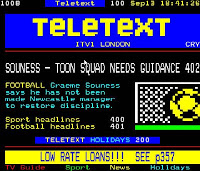‘England through after dramatic penalty win’ was the headline writ large on ITV’s Oracle Teletext service. It was the evening of June 30th 1998 and David Batty had just seen his penalty saved by the Argentinian goalkeeper Carlos Roa in a Round of 16 World Cup match. England had been defeated 4-3 on penalties after a 2-2 draw, and this was soon reflected in the hastily corrected headline that appeared only seconds later: ‘England out of World Cup after penalty miss’.
Teletext always tried to be first with the breaking news headlines and even if it did so by wrongly pre-empting imminent events, at least its heart was in the right place. This was, after all, old technology – an Information Single-Carriageway bringing pages of news and facts by the dozen to ordinary TV screens throughout the UK.
Though many favoured Oracle, it was the BBC’s Ceefax service that most people preferred. At least it seems that way; you only have to utter the word ‘Ceefax’ to a football fan of a certain age and the chances are they’ll respond with a simple number: 302.
Ceefax page 302 was a gateway to enlightenment, aspiration and fulfilment for every follower of football hungry to know more. Who were United about to sign? Who’d picked up a serious injury and wouldn’t be playing for Liverpool? Had Arsenal won their League Cup match the night before? These questions and many more were inevitably answered among Ceefax’s neatly regimented pages.
Very useful they were too, but for many, Ceefax really came into its own around 3pm on a Saturday afternoon. It was at this moment that thousands of British football fans pressed the ‘Text’ button on their remote controls and blanked out Grandstand to see the latest scores. Some aficionados with excellent eyesight preferred the ‘Mix’ button to get the double hit of football scores and UK Snooker from the Guild Hall in Preston displayed simultaneously, but they were clearly in the minority. As for those pressing 316 to get the latest two scores appearing on the bottom of their screens while they watched their regular programmes, they were among the absolute elite.
Keying in 303 on your remote got you the latest scores from Division One. With ten matches to cover and any number of goalscorers and sending offs to account for, Ceefax partitioned the scores onto three or four sub-pages that were displayed on rotation for around ten seconds at a time.
Once kick-off was out of the way, we viewers entered into a game of memory and observation. It was all very simple at first; with every score set to ‘0-0’, it wasn’t difficult to spot the name of a goalscorer suddenly appearing below an updated 1-0 scoreline. As more and more goals went in however, the screen gradually filled with player names and times (‘Sterland 26’, ‘Strachan 34’…) By half time, you were trying to remember whether you’d already acknowledged one score or another, but shoot – that was all part of the fun.
Admittedly there were occasional frustrations to be had with monitoring the latest scores on Ceefax. For a start, there was the aforementioned ten-second delay. Knowing that your team’s scoreline was on page 1 of 3, it seemed like an eternity to wait before it rolled around again through page 2 and eventually page 3.
Not only that - every so often Ceefax would also play its trump card by skipping the page you wanted and going on to the next one – never good on a day when a glut of goals caused a fourth page to appear in the sequence.
Back in the day, it wasn’t uncommon to employ mitigating actions to reduce the inconvenience caused by the long wait. There was the ‘Number Re-Entry’ method: here the holder of the remote control would type in the same three-figure page number already being viewed in an attempt to make Ceefax update the text. More often than not, this old alternative to an F5 Refresh was not successful.
Others would use the ‘Short Walk’ method where it was preferable to go off and view another page for a few short seconds before jumping back to the original one. This called for a cool head and immaculate timing; get it wrong by a second or two and you could find yourself waiting another lifetime for the pages to go round in sequence once more.
At the other end of the scale, pages sometimes refreshed too quickly. Regular visitors to page 312 - ‘News in Brief’ - would sometimes be greeted by the sight of 10 or more sub pages of text. A wondrous thing, but you had to be quick. Those that dwelled too long on the latest news from the South American championships could easily find themselves dumped onto the next page in sequence before they’d had the chance to finish reading the previous one. Efficient use of the ‘Hold’ button was key in such situations.
But what are we saying... All these time issues were actually what gave Ceefax its old-world appeal. The sense of growing expectation as you waited for one page to be replaced by another only added to the thrill of it all, if indeed ‘thrill’ is the appropriate word here.
How strange, then, to suddenly find ourselves in an era where Jeff Stelling appears on Sky Sports every Saturday, his head and shoulders entrapped by manifold results, news tickers and videprinters. None of us could ever have dreamed of having so much information at our fingertips all those years ago, but there’s no harm in dreaming about the old days every once in a while too. Where Ceefax’s football pages were concerned, less was definitely more.


